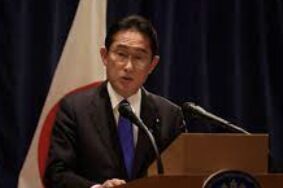China Condemns Japan's Prime Minister for Sending Ritual Offering to Controversial Yasukuni Shrine, Deepening Historical Tensions
China lodges formal complaint against Japan over Prime Minister Kishida's offering to controversial Yasukuni shrine, highlighting historical tensions and complexities in East Asia's regional relations.
In a recent development, China has expressed its strong disapproval and lodged a formal complaint against Japan regarding Prime Minister Fumio Kishida's act of sending a ritual offering to the controversial Yasukuni shrine in Tokyo.
The Chinese foreign ministry issued a statement on Tuesday in which it condemned this action, emphasizing the shrine's significance as a symbol of Japan's previous military aggression.
The Yasukuni shrine has long been a contentious issue between Japan and its neighboring countries, particularly China and South Korea. It is widely perceived as a reminder of Japan's past militarism and the atrocities committed during its imperialistic expansion.
Consequently, it evokes painful memories for those countries affected by Japan's actions during World War II. The Chinese government's strong response reflects the sensitivity and deep-rooted historical issues surrounding the Yasukuni shrine. Beijing's representations to Japan underscore its commitment to addressing the historical tensions between the two countries.
The gesture by Prime Minister Kishida has only served to exacerbate the strained relations and raises concerns about the potential for further friction in the region. This incident not only highlights the ongoing historical disputes in East Asia but also underscores the complexities and challenges faced by the governments in maintaining stable regional relations.
It is crucial for diplomacy and dialogue to take precedence in order to find peaceful resolutions to these historical grievances. The reaction from China serves as a stern reminder to Japan and the international community of the lingering wounds caused by Japan's past actions.
As tensions persist, efforts for reconciliation and healing must be prioritized by both countries, recognizing the importance of acknowledging historical wrongdoings and ensuring a more peaceful and cooperative future in the region.




